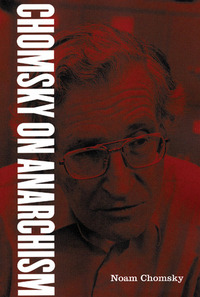You need to sign in or sign up before continuing.
Take a photo of a barcode or cover
informative
inspiring
reflective
slow-paced
informative
reflective
slow-paced
Learned a lot about the Spanish Civil War. The lecture on language and freedom was quite dry for me.
Interesting collection of writings about the essential tenets of anarchism. If you have no idea what anarchism is (or if you think it involves unrestrained chaos and/or violence), this would be a good place to start. While occasionally repetitive (this is a collection of multiple separate pieces, not a single, unified work), this book is good at driving home what anarchism philosophically is and digging into its roots in Enlightenment libertarian philosophy.
My biggest frustration is that it's much lighter on specifics, namely, how any of this would look in practice. The longest chapter is spent digging into conflicts between anarchist groups and Soviet-backed communists during the Spanish Civil War, but even that is more focused on how the opposition crushed the anarchist collectives, rather than what they looked like and what kind of example they might set for modern anarchists looking to build upon their philosophical foundations. Chomsky preemptively dismisses some of this criticism by arguing that anarchism must be flexible and will look different in different times and places; in the "Excerpts from Understanding Power" chapter (which takes the form of an interview), he comments, "I don't think you can lay it out in detail — nobody's smart enough to design a society; you've got to experiment. But reasonable principles on which to build such a society are quite clear" (p 22). In the "Language and Freedom" essay, he also emphasizes the idea that even if the inauguration of a more free society is messy or even violent, that does not mean it is bad or should not be allowed; he quotes Kant saying, "one cannot arrive at the maturity for freedom without having already acquired it" (p 125).
While I understand the need for flexibility to meet varied situations, I would argue that some kind of concrete plan or set of actionable goals is necessary to actually inspire change. Lofty ideals are important to have as a lodestar, but they don't, on their own, create an impetus for change. I would quote Justine in the Contrapoints video "The Left": "If you have purely theoretical political beliefs, you're never accountable for the way things are going." Perhaps this should be down to more local organizers to hash out; I'd buy that as a starting point. But more concrete examples and suggestions would still be awfully useful for that process.
My biggest frustration is that it's much lighter on specifics, namely, how any of this would look in practice. The longest chapter is spent digging into conflicts between anarchist groups and Soviet-backed communists during the Spanish Civil War, but even that is more focused on how the opposition crushed the anarchist collectives, rather than what they looked like and what kind of example they might set for modern anarchists looking to build upon their philosophical foundations. Chomsky preemptively dismisses some of this criticism by arguing that anarchism must be flexible and will look different in different times and places; in the "Excerpts from Understanding Power" chapter (which takes the form of an interview), he comments, "I don't think you can lay it out in detail — nobody's smart enough to design a society; you've got to experiment. But reasonable principles on which to build such a society are quite clear" (p 22). In the "Language and Freedom" essay, he also emphasizes the idea that even if the inauguration of a more free society is messy or even violent, that does not mean it is bad or should not be allowed; he quotes Kant saying, "one cannot arrive at the maturity for freedom without having already acquired it" (p 125).
While I understand the need for flexibility to meet varied situations, I would argue that some kind of concrete plan or set of actionable goals is necessary to actually inspire change. Lofty ideals are important to have as a lodestar, but they don't, on their own, create an impetus for change. I would quote Justine in the Contrapoints video "The Left": "If you have purely theoretical political beliefs, you're never accountable for the way things are going." Perhaps this should be down to more local organizers to hash out; I'd buy that as a starting point. But more concrete examples and suggestions would still be awfully useful for that process.
challenging
informative
reflective
medium-paced
i'm not attaching a star rating because whatever i would rate this work would be an oversimplification. on anarchism is a good intro, and i think anyone who finds themselves in the libertarian left corner of the political compass would find things in here they agree with, and anyone interested in politics would find something in here that's truly thought provoking.
I always recommend Chomsky to anyone that will listen. His way of thinking, speaking, writing, is incredibly accessible and he takes care to break down academic barriers that would otherwise prevent people from seeking out or being able to understand theory or hopefulness even, for what could be. On Anarchism is a wonderful example of this as it is written almost conversationally, and even has some varying formats of communication, including some essay form, some interview transcript form, etc. Just because this is the way things are, doesn't mean this is the way things have to be. we can hope for something better.
challenging
informative
slow-paced
informative
slow-paced
informative
With an interest in politics, protest and activism, I chose this book to try and understand what Anarchism is from one of the prominent voices who challenges our capitalist societal position.
I'm not necessarily the most knowledgeable about the many terms used but I think this book has helped me grasp what Chomsky's perspective is and in turn form my own idea of the concept.
I particularly appreciated the chapter which was written in interview form - as it allowed me to understand the focus of the piece of text, whereas some of the chapters I got slightly lost in the text as it felt there was a degree of assumed knowledge from the reader that I maybe did not have.
I enjoyed this book, and I enjoyed being challenged. I liked that Chomsky was open about the fact he didn't quite know how Anarchism would work, but is confident that with trial and error - it could. I found myself coming round to this idea and seeing how this concept actually aligns with much of my feelings about society. Turns out I'm more of an Anarchist than I thought!
I'm not necessarily the most knowledgeable about the many terms used but I think this book has helped me grasp what Chomsky's perspective is and in turn form my own idea of the concept.
I particularly appreciated the chapter which was written in interview form - as it allowed me to understand the focus of the piece of text, whereas some of the chapters I got slightly lost in the text as it felt there was a degree of assumed knowledge from the reader that I maybe did not have.
I enjoyed this book, and I enjoyed being challenged. I liked that Chomsky was open about the fact he didn't quite know how Anarchism would work, but is confident that with trial and error - it could. I found myself coming round to this idea and seeing how this concept actually aligns with much of my feelings about society. Turns out I'm more of an Anarchist than I thought!




